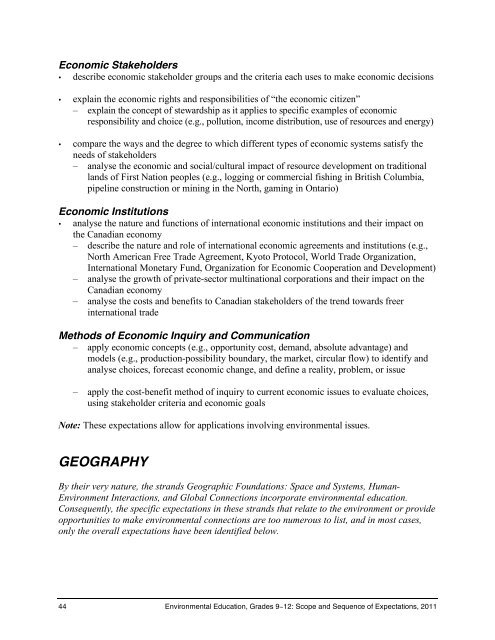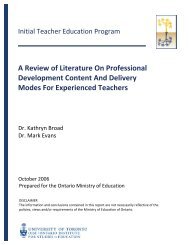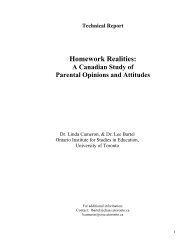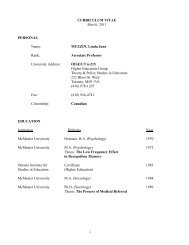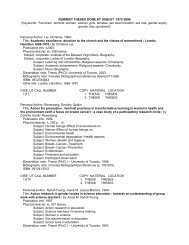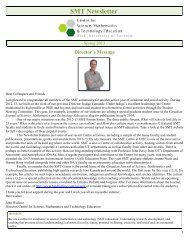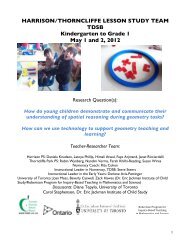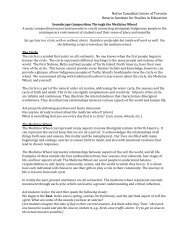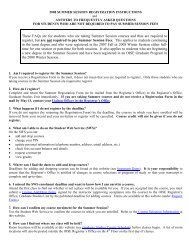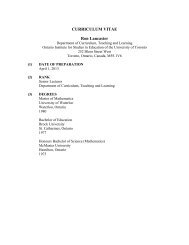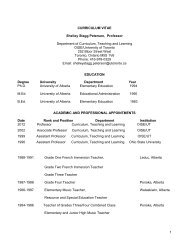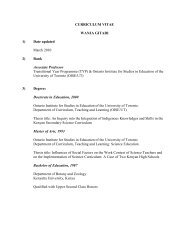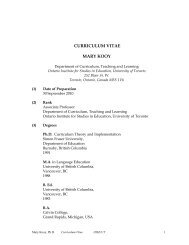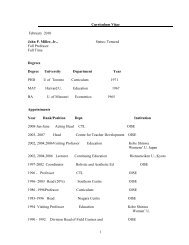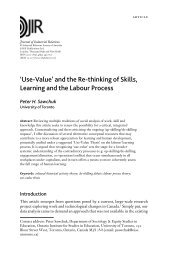The Ontario Curriculum, Grades 9-12 - Ministère de l'éducation ...
The Ontario Curriculum, Grades 9-12 - Ministère de l'éducation ...
The Ontario Curriculum, Grades 9-12 - Ministère de l'éducation ...
You also want an ePaper? Increase the reach of your titles
YUMPU automatically turns print PDFs into web optimized ePapers that Google loves.
Economic Stakehol<strong>de</strong>rs<br />
• <strong>de</strong>scribe economic stakehol<strong>de</strong>r groups and the criteria each uses to make economic <strong>de</strong>cisions<br />
• explain the economic rights and responsibilities of “the economic citizen”<br />
– explain the concept of stewardship as it applies to specific examples of economic<br />
responsibility and choice (e.g., pollution, income distribution, use of resources and energy)<br />
• compare the ways and the <strong>de</strong>gree to which different types of economic systems satisfy the<br />
needs of stakehol<strong>de</strong>rs<br />
– analyse the economic and social/cultural impact of resource <strong>de</strong>velopment on traditional<br />
lands of First Nation peoples (e.g., logging or commercial fishing in British Columbia,<br />
pipeline construction or mining in the North, gaming in <strong>Ontario</strong>)<br />
Economic Institutions<br />
• analyse the nature and functions of international economic institutions and their impact on<br />
the Canadian economy<br />
– <strong>de</strong>scribe the nature and role of international economic agreements and institutions (e.g.,<br />
North American Free Tra<strong>de</strong> Agreement, Kyoto Protocol, World Tra<strong>de</strong> Organization,<br />
International Monetary Fund, Organization for Economic Cooperation and Development)<br />
– analyse the growth of private-sector multinational corporations and their impact on the<br />
Canadian economy<br />
– analyse the costs and benefits to Canadian stakehol<strong>de</strong>rs of the trend towards freer<br />
international tra<strong>de</strong><br />
Methods of Economic Inquiry and Communication<br />
– apply economic concepts (e.g., opportunity cost, <strong>de</strong>mand, absolute advantage) and<br />
mo<strong>de</strong>ls (e.g., production-possibility boundary, the market, circular flow) to i<strong>de</strong>ntify and<br />
analyse choices, forecast economic change, and <strong>de</strong>fine a reality, problem, or issue<br />
– apply the cost-benefit method of inquiry to current economic issues to evaluate choices,<br />
using stakehol<strong>de</strong>r criteria and economic goals<br />
Note: <strong>The</strong>se expectations allow for applications involving environmental issues.<br />
GEOGRAPHY<br />
By their very nature, the strands Geographic Foundations: Space and Systems, Human-<br />
Environment Interactions, and Global Connections incorporate environmental education.<br />
Consequently, the specific expectations in these strands that relate to the environment or provi<strong>de</strong><br />
opportunities to make environmental connections are too numerous to list, and in most cases,<br />
only the overall expectations have been i<strong>de</strong>ntified below.<br />
44 Environmental Education, <strong>Gra<strong>de</strong>s</strong> 9−<strong>12</strong>: Scope and Sequence of Expectations, 2011


